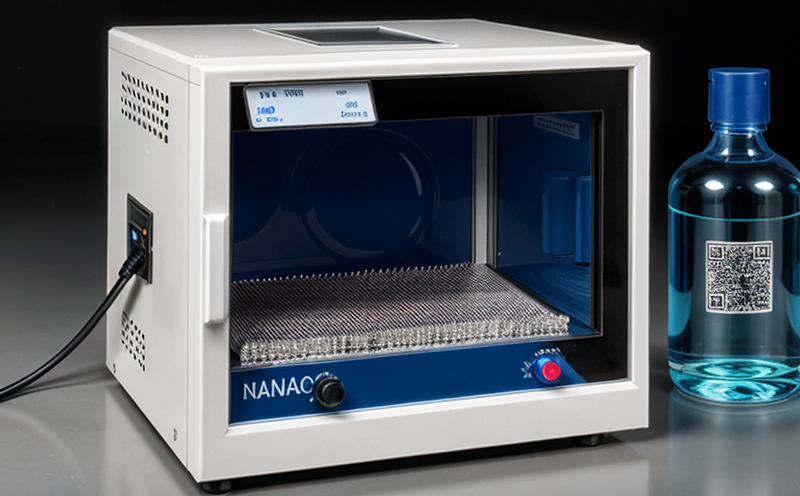ISO 22197 Photocatalytic Activity Testing of Nanomaterials
The ISO 22197 standard provides a robust framework for assessing the photocatalytic activity of nanomaterials, which are increasingly critical in various industries such as environmental remediation and water purification. This testing procedure is essential because it helps ensure that nanomaterials meet stringent quality control standards and can effectively perform their intended functions.
Photocatalysis involves the use of light to initiate a chemical reaction. When nanomaterials are exposed to sunlight, they generate reactive species capable of breaking down organic compounds and degrading pollutants in water or air. This makes them particularly valuable for environmental applications. However, not all nanomaterials exhibit photocatalytic activity, and those that do may have varying efficiencies depending on their chemical composition and surface properties.
The ISO 22197 method is designed to measure the efficiency of a nanomaterial in degrading organic compounds under visible light conditions. The test involves exposing a known quantity of the nanomaterial to a solution containing an organic pollutant, typically methylene blue or rhodamine B, which serve as model compounds for real-world contaminants. After a specified incubation period, the remaining amount of the pollutant is determined using spectrophotometric analysis.
Accurate and reliable testing is crucial when dealing with nanomaterials due to their small size and high reactivity. Inadequate testing can lead to overestimation or underestimation of photocatalytic activity, which in turn could result in poor environmental performance or regulatory non-compliance. Our laboratory adheres strictly to ISO 22197 guidelines to ensure precise and reproducible results.
Our team of experienced scientists specializes in handling nanomaterials with care, using state-of-the-art equipment to conduct the test. This includes ultrasonicators for dispersing nanoparticles into solution, UV-Vis spectrophotometers for measuring pollutant degradation, and temperature-controlled incubators to maintain consistent conditions throughout the reaction.
Compliance with ISO 22197 is not just a requirement; it's an essential part of our commitment to delivering accurate, reliable, and actionable data. By adhering strictly to this standard, we provide clients with confidence that their nanomaterials are performing as expected in real-world applications.
Understanding the photocatalytic activity of nanomaterials is vital for several industries. For instance, in environmental engineering, it helps in designing efficient water treatment systems. In medical research, it aids in developing safer and more effective drug delivery systems. And in consumer goods manufacturing, it ensures that products like sunscreens or paints have optimal performance.
Our laboratory's proficiency in ISO 22197 testing positions us as a leader in nanotechnology assessment. With our advanced facilities and skilled personnel, we can offer comprehensive analysis tailored to your specific needs. Whether you're an R&D engineer seeking validation of new formulations or a compliance officer ensuring regulatory adherence, our services are designed to meet your requirements.
Why It Matters
The importance of photocatalytic activity testing cannot be overstated in today's world where sustainability and environmental responsibility are paramount. Nanomaterials have the potential to revolutionize industries but only if they can reliably perform their intended functions. By accurately measuring photocatalytic activity, we help ensure that these materials contribute positively to solving global challenges such as pollution control and resource efficiency.
From a business perspective, ISO 22197-compliant testing provides several key benefits:
- Innovation Support: Ensures that new nanomaterials are safe and effective before commercialization.
- Regulatory Compliance: Helps companies meet environmental regulations and avoid costly penalties.
- Market Differentiation: Demonstrates commitment to quality and reliability, enhancing brand reputation.
- Risk Mitigation: Identifies potential issues early in the development process, reducing risks associated with product failure or recall.
In summary, ISO 22197 testing is not just about meeting standards; it's about driving innovation and ensuring sustainability. It plays a crucial role in advancing technologies that can improve our quality of life while minimizing environmental impact.
Eurolab Advantages
At Eurolab, we pride ourselves on delivering top-tier services through our comprehensive suite of testing capabilities and unwavering commitment to customer satisfaction. When it comes to ISO 22197 photocatalytic activity testing of nanomaterials, here's what sets us apart:
- Expertise: Our team comprises highly qualified chemists and materials scientists who possess in-depth knowledge of nanotechnology.
- Accreditation: We are ISO/IEC 17025 accredited, ensuring that our procedures meet the highest industry standards.
- Advanced Equipment: Our laboratory is equipped with cutting-edge instruments such as UV-Vis spectrophotometers and temperature-controlled incubators.
- Custom Solutions: We offer tailored testing programs to cater specifically to your organization's unique needs.
- Rapid Turnaround Times: Efficient processes mean quicker results without compromising on accuracy.
- Comprehensive Reporting: In-depth reports are provided, including raw data and interpretations, allowing for informed decision-making.
Our goal is to provide you with not just test results but also actionable insights that drive innovation and success in your organization. Whether you're an academic researcher or a corporate executive, Eurolab's expertise can help you achieve your goals more efficiently.
Competitive Advantage and Market Impact
ISO 22197 photocatalytic activity testing of nanomaterials is increasingly becoming a key differentiator in the competitive landscape. As industries become more environmentally conscious, there's growing pressure on companies to adopt sustainable practices. By demonstrating compliance with this rigorous standard, organizations can establish themselves as leaders in their respective fields.
For quality managers and compliance officers, ISO 22197 testing ensures that all nanomaterials used within your organization meet the highest standards of safety and performance. This not only bolsters your reputation but also helps avoid potential legal issues arising from non-compliance.
R&D engineers can use our services to validate their innovative concepts, ensuring they are both feasible and effective in real-world applications. Meanwhile, procurement professionals benefit by identifying reliable suppliers who adhere strictly to quality control measures.
The market impact of ISO 22197 testing extends beyond individual organizations; it contributes significantly to the broader goal of fostering sustainable development. By promoting responsible use of nanomaterials, we help create a more environmentally friendly future. This aligns with global initiatives aimed at combating climate change and preserving natural resources.
In conclusion, ISO 22197 testing is not just a technical requirement; it's a strategic tool that can give your organization the edge in today's competitive market.





